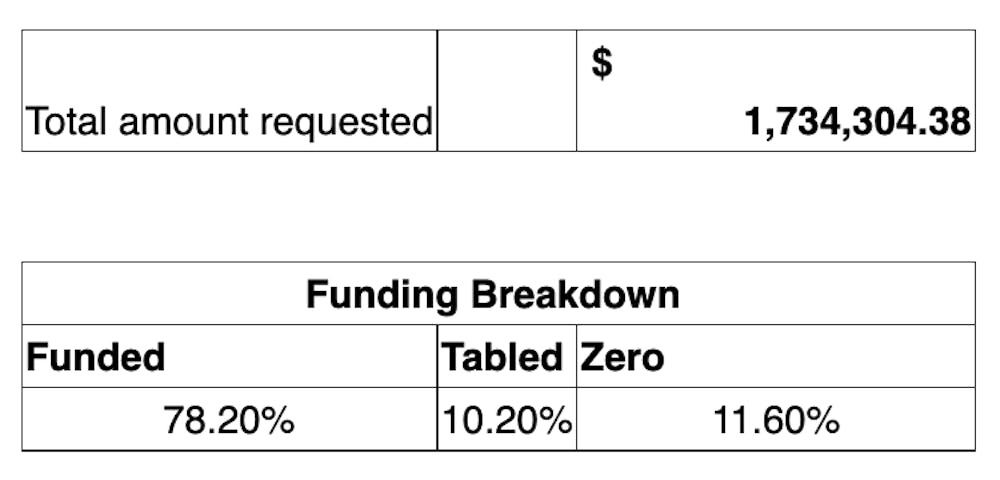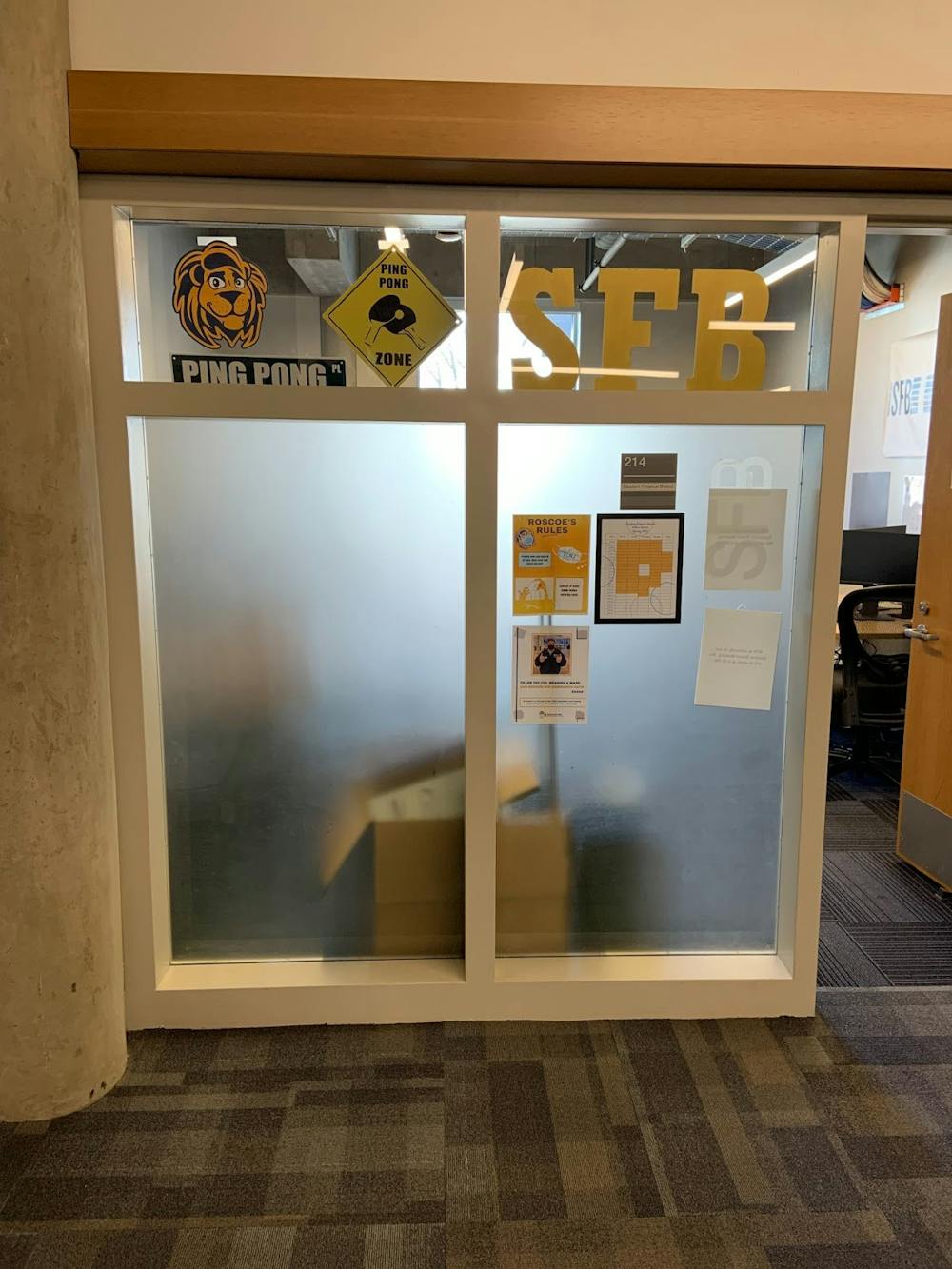By Rishi Shah
Director of Operations
Hafsah Shaik opened the email thinking it was just another ordinary update from the Student Finance Board (SFB), casually reading while sitting at work in the library. As she scanned through the email, though, her eyes widened as the gravity of the situation weighed down on her. She could read the words on the screen, but it didn’t seem to register them in her brain.
The email in question was sent by SFB on Feb. 1 and contained information that would prove to have an unprecedented impact on recognized student organizations (RSOs) at the College.
According to the email sent by the Executive Director of SFB Neil Trivedi, the organization responsible for funding RSOs would be “suspending Spring 2022 SAF allocations until further notice” after they were forced to dip into their emergency reserves.

The financial breakdown of SFB’s operations reveal that they were forced to dip into their reserves to fund base budgets for the spring semester (Photos courtesy of Neil Trivedi).
“I was just worried,” Shaik said. “It’s a scary thing to happen to SFB, especially because I’ve never heard of this happening before. I was like, ‘whoa, what happened?’ There’s no more money?”
In a frenzied panic, Shaik – a junior psychology major who serves as the Student Government vice president for Diversity, Equity and Inclusion – texted the Student Government treasurer with a number of questions, asking what they were going to do and if they could reallocate funds toward events Shaik had planned for the semester.
Shaik was not the only person or organization impacted by the pause in funding.
As a student-run organization, SFB is responsible for allocating the Student Activity Fee (SAF) to recognized student organizations at the College in a fiscally responsible manner. The SAF is composed of money compiled from a fee charged to each student every semester, with the goal of SFB being to allocate all of this money to support events occurring at the College. Many organizations rely on the SAF as a lifeline for the events they host, depending on consistent funding to keep themselves running.
While most organizations need to submit a base budget before the start of the semester, which allows SFB to approve funding long before an event is held, many wait until they have more details or information about the event they want to host before applying for funding. These organizations would submit what is called a special application, which is submitted for approval at least 14 days before the event is scheduled to be held.
It is these organizations waiting to submit a special application in the spring that were most affected by SFB’s decision to pause funding, along with organizations with funds that were tabled for future discussion due to a lack of information in the request.
These student organizations were left scrambling to find ways to fund planned activities for the spring semester.
One such organization was Saathiya, the College’s Indian-fusion dance team. Members of Saathiya were fresh off of a plane ride from Purdue University, where they had placed second at a Bollywood-fusion dance competition, when the email from SFB was sent.
Saathiya was slated to perform at the University of Maryland on Feb. 19, working for hours every week in preparation for the competition. They had originally planned on submitting a special application to SFB to fund train tickets to the Maryland competition, but the pause in funding forced them to resort to other methods.
“Since SFB cut funding, we’re not able to take a train so we had to make last-minute transportation changes and have people drive their own cars to Maryland,” said Ishika Sheladia, a sophomore biology major and member of Saathiya. “Other people are now liable for driving other people to the competition, which is kind of a big deal; transportation is usually covered for competitions.”
While Sheladia noted that the cost of gas would be reimbursed by SFB, she also said that the board had yet to reimburse Saathiya for many expenses from the fall semester.
Saathiya is not the only organization to be impacted by the pause in SAF funding for the spring semester. As vice president for Diversity, Equity and Inclusion in Student Government, Shaik had been planning on hosting an Inclusion Week for quite some time before the email was sent.
Inclusion Week is Shaik’s take on the multicultural event that used to be held at the College, “Epcot,” with a wide array of student organizations focused on diversity, equity and inclusion getting together in one massive event with different tables and booths to promote awareness about other cultures, disability, gender, sexuality and religion.
“I had plans for Inclusion Week – this is like a big collaboration with a lot of different organizations, and they were very busy last semester so they couldn’t meet, so I was like, meet with them in the beginning of the semester and do a special application as we figure out plans,” Shaik said.
She planned on using the funds she received from SFB to provide food at the event to increase attendance and bring in renowned speakers. However, the lack of funding forced her to look at the issue from a different perspective.
“I wanted to get this traveling Black History Month museum which costs $2,000, so I couldn’t get that, which would’ve been helpful but then it made us all think critically: how can we engage students without anything shiny? It made me rely a lot more on the RSOs to bring in their community of students,” she said.
Shaik described the pause in funding as almost a “blessing in disguise,” allowing her to become more creative with how she could engage students.
“It was definitely a kink in the road, but it didn’t cancel our plans,” she said.
Another organization that faced the issue of dealing with no funding was Late Night Take (LNT), a group that calls itself the “official television appreciation club of the College of New Jersey.” They have hosted movie screenings in past semesters and may be better known as the organization that brought Terry Crews to speak at the College.
The head of LNT, senior computer science major Svanik Shirodkar, is also the operations director of SFB. Shirodkar was able to offer a unique perspective on the situation as a member of both organizations, although he clarified that he was speaking primarily as the head of LNT and not as a representative of SFB.
LNT was not funded for food for any of their movie events this semester, despite being fully funded for food last semester, forcing them to change the timing of their screenings.
“One of the missions [of LNT] is providing late night programming on campus. The funding really does affect the organization a lot in terms of our mission and goals and trying to put on events,” Shirodkar said. “It does affect the core principle of how the organization was started because we’re unable to do events during that dinner hour because we don’t have the money for food.”
Shirodkar acknowledged that the lack of funding was motivated in part by the dangerously low funds available, but he raised an issue with the lack of consistency when SFB made decisions about funding.
“The way they went about doing the funding decisions had no consistency and it did appear that decisions were being made kind of on a whim,” he said. “The main question and confusion is just how these decisions are being made and on what basis.”
Shirodkar explained that the reason of “fiscal responsibility” was used arbitrarily by SFB in funding decisions, causing concerns over inconsistency.
Neil Trivedi, senior economics major and executive director of SFB, provided some context about the situation from SFB’s perspective.
He explained that as SFB reviewed close to 90 base budgets before the start of the spring semester, it became clear that SFB was “dangerously low in how much remaining funds [they] would have in [their] reserves account.”
Christine Stellerine, SFB’s business manager, advised the board about the impending financial problems early on.
“I notified the board at the beginning of the base budget review process, which started in December, that we were going to have a problem on our hands. The amount that was requested by student organizations for the spring semester was more than what was being given to us in the SAF,” she said. “And this is the first time that has happened, so I kind of said to the board, you have to make some choices, because you can’t fund everything, which has been more the process in the past, if it meets our funding guidelines, it’s an automatic yes. We needed to draw some more lines in the sand.”
Trivedi described how when he was presented with the spreadsheet of the updated finances by Stellerine, “reality kicked in. Our primary goal always is to allocate funds to student organizations, so what steps can we take so we can be kind of proactive and resume funding as soon as possible?”
He noted that all of the organizations that submitted a base budget were able to be reviewed and approved for their requests. However, the dire situation required an urgent response; the decision to pause funding was made on Jan. 31, and the email notifying RSOs was sent the following day.

A majority of base budgets were able to be funded despite the amount requested by RSOs exceeding the amount available in the SAF after other operational expenses were deducted (Photo courtesy of Christine Stellerine).
“It’s a tough piece of information to deliver to orgs that we aren’t funding at all,” said Trivedi.
He expressed his desire to evaluate SFB’s funding practices, especially when it comes to serving all organizations rather than prioritizing those with bigger, six-figure budgets and ensuring sound financial practice by not approving requests when there simply is not enough money to fund every request.
Stellerine explained how factors that normally would not have to be considered had to be thought through given the situation SFB was in. One factor was whether a request from one RSO would be at the detriment of another RSO getting funding; she mentioned food explicitly as something that was not necessarily needed at certain events, with those funds being of better use to other organizations. Another consideration was whether RSOs were fully funded in the fall and if they already had the chance to host events.
With such a tremendous impact on the daily operations of all student organizations, SFB attempted to provide alternatives and solutions to the issue. In a follow-up email sent on Feb. 5, the board announced updates on how it would go about clearing up and washing-back funds so that it could resume allocating. RSOs would be able to report funds that they did not use so that other organizations could use them (“wash-back”) and report canceled events to return funds to SFB (“clearing up”).
The drastic implications of the pause in funding were suddenly alleviated just after two weeks after the initial email was sent when on Feb. 16, SFB sent another email explaining that funding for the spring semester would resume again after $200,000 in wash-back funds was made available.
Funding would be prioritized for tabled events and requests from spring 2022 base budgets, followed by appealed funding decisions from the spring base budgets and then new special applications or capital equipment expenditures.
Even with the return to funding, the temporary pause made organizations on campus come to terms with the fact that there is a limit to how much money SFB can provide.
“It really did come as kind of a blindside to a lot of RSOs and to organizations — to the campus community in general,” Shirodkar said.







